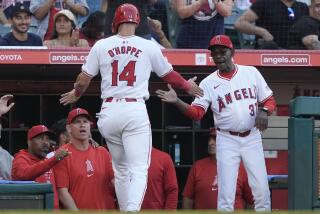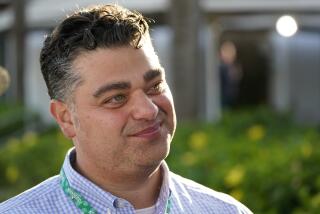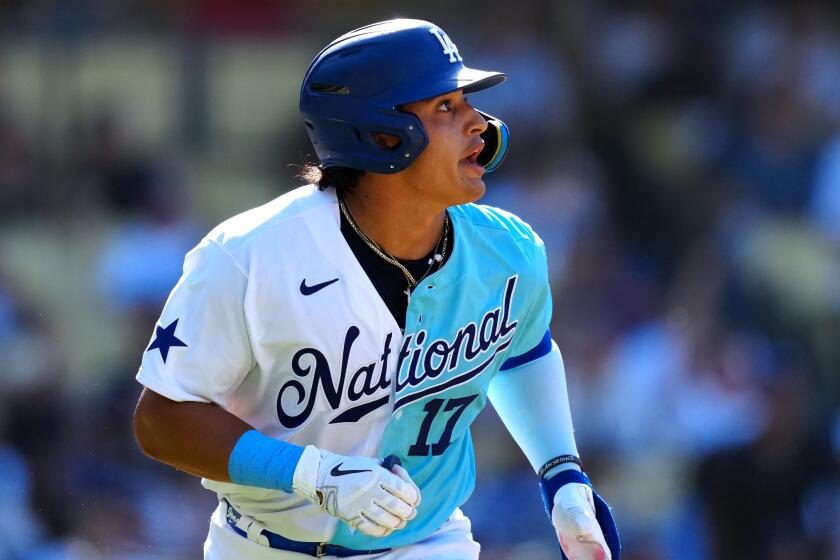Angels executive Scott Servais has an eye for talent
Reporting from Dallas — When morning workouts begin at spring training, you won’t find Scott Servais in slacks and a dress shirt with a cellphone attached to his ear, the typical attire for a baseball front-office executive.
The Angels’ new assistant general manager will be in full uniform, shagging balls in the outfield, getting down and dirty with the catchers and chatting up players as they go from one drill to the next.
“I think it breaks down the walls with players,” said Servais, a former big league catcher. “You have to get to know your own players better than anyone else’s. You can make mistakes when you don’t know your players well enough. Sometimes you trade the wrong guys, or maybe you don’t give enough guys a chance.”
Servais, 44, made no mention of Mike Napoli here, but he could have been referring to the former Angels catcher who was traded last winter and had a career year for Texas.
Someone, whether it was former general manager Tony Reagins, his assistants or scouts, Manager Mike Scioscia, or a combination thereof, gave up on Napoli too soon.
Like former Angels Darren Oliver and Vladimir Guerrero, Napoli went to Texas and played a key role — he hit .320 with 30 homers and 75 runs batted in — in the Rangers’ World Series run.
In hiring Servais, who spent the last six years building one of baseball’s best farm systems at Texas, new Angels GM Jerry Dipoto may have begun to reverse that flow of talent between the American League West rivals.
“It’s a monumental loss for us,” Rangers assistant GM Thad Levine said. “It’s going to take time in Anaheim, but in three, four or five years, you’ll be looking at a model organization from top to bottom.
“He will have a major impact on one of our biggest competitors, and so will Jerry. It’s very concerning from our perspective that they’re in the positions they’re in. The division just got a lot better.”
The Rangers went 79-83 in 2005, and their farm system was ranked 28th by Baseball America when Jon Daniels took over as GM.
Among Daniels’ first hires was Servais, who as senior director of player development made numerous changes in the scouting and minor league coaching staffs, implemented a new draft philosophy, helped open a new academy in the Dominican Republic and boost international scouting efforts.
Daniels fortified the farm system with the Mark Teixeira trade, which netted eventual closer Neftali Feliz, shortstop Elvis Andrus and pitcher Matt Harrison.
The draft brought players such as Derek Holland, Mitch Moreland, Tommy Hunter and Chris Davis, who would eventually plug big league holes or be used in trades for impact players such as Cliff Lee and Mike Adams.
From 2006 to 2007, the Rangers jumped from 28th to fourth in Baseball America’s organizational rankings. They ranked first in 2009 and second in 2010. And their big league club reached the World Series in 2010 and 2011.
“He wanted to promote a winning culture, but unfortunately, he inherited a lot of coaches, scouts and players who were in the culture of losing for a long time,” Levine said of Servais.
“One of the first things Scott did was identify those who were capable of making the transition to a winning culture and replacing guys who were not.”
The Angels’ farm system does not need an overhaul, but Servais plans to put more of a draft emphasis on athleticism and makeup and teaching players how to be more professional and competitive.
“When Ian Kinsler comes out of the 15th round, Mitch Moreland comes out of the 17th round and Derek Holland out of the 20th round, everyone says, ‘Wow, what great scouting those guys have,’ ” Servais said.
“But if they were that well-scouted, they would have gone in the first three rounds. For me, you have to have a minor league system that allows these guys to flourish.”
Texas spent $17.6 million on international signings last year, the most in baseball, and Servais has extensive scouting experience in Latin America, an area in which the Angels need to grow.
“We will bump up our resources there,” Servais said. “Will it be to the level of the Rangers? Probably not, but we have to upgrade the facility [in the Dominican Republic].
“I love Latin America because you can beat people there. You’re limited in the draft. You get one pick and have to wait 30 times until your next one. In Latin America, if you have the resources, you can really get after it.”
Plate discipline and on-base percentage will also be emphasized more.
“It starts from the day they put an Angels uniform on,” Servais said. “The strike zone is like the line of scrimmage. In football, you win the battle at the line, you usually win the game. If you control the strike zone in baseball, you’re going to have success.
“We won’t ask kids to take pitches — that’s not the philosophy. But you make it important every day that they get deep into counts, grind at-bats, be tough outs, because that plays in the big leagues.”
Servais, a La Crosse, Wis., native who spent 12 years (1991-2002) as a big league catcher, will oversee the Angels’ scouting and player development departments.
“You hope to turn your scouting and player development into a well-oiled machine,” Servais said. “The first thing is you have to get all the right parts — the coaches, the systems — in place.”
Servais is a key ingredient.
“Scott was the primary architect of our player development system, one of the founding fathers of what we do,” Levine said. “He impacted every major move we made from the day he came in to the day he left.”
twitter.com/MikeDiGiovanna
More to Read
Go beyond the scoreboard
Get the latest on L.A.'s teams in the daily Sports Report newsletter.
You may occasionally receive promotional content from the Los Angeles Times.











